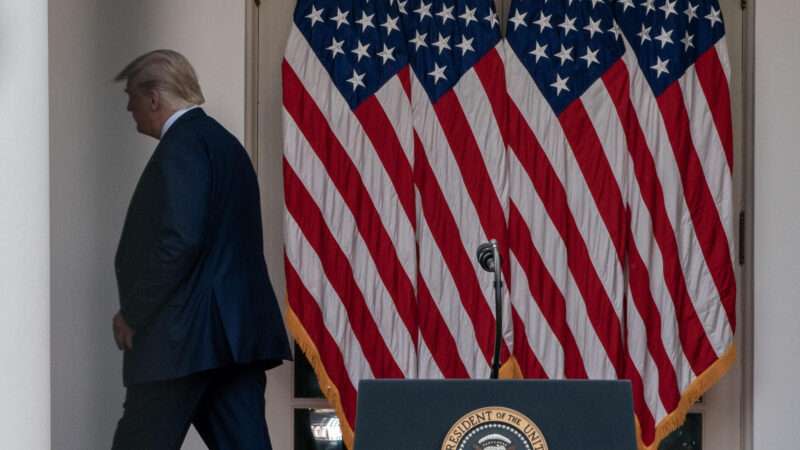Trump Said Tariffs Would Reduce the Trade Deficit. Instead, It Grew.

During former President Donald Trump's term in office, he promised that higher tariffs on American imports would reduce the country's large trade deficit.
At the time, many economists disputed that notion. Tariffs might marginally reduce the import side of the trade ledger, but they also reduce economic output (and therefore exports), so the net effect on the trade deficit was likely to be minuscule, they warned.
No matter. In 2017, the White House's official Trade Policy Agenda highlighted how America's manufacturing trade deficit had grown from $317 billion in 2000 to $648 billion in 2016. That was evidence, the document claimed, that greater levels of trade had triggered "a period of slowed GDP growth, weak employment growth, and sharp net loss of manufacturing employment in the United States."
You know what happened next. Tariffs were raised. Then more tariffs were added. President Joe Biden took over and left Trump's higher tariffs in place. American businesses and consumers paid the cost of those higher taxes. The average tariff rate on imports to the United States has climbed from 1.5 percent to over 3 percent, and annual tariff revenue has nearly tripled.
So what happened to the trade deficit? It didn't fall.
In 2017, the last full year before Trump's tariffs were imposed, America's overall trade deficit was $517 billion. By 2023, it had grown to $785 billion, according to new Census Bureau data.
The story is the same when you look at the manufacturing trade deficit, the narrower category that the Trump administration had highlighted in that 2017 report. It climbed to over $1 trillion by 2021, nearly 60 percent higher than the 2016 figure that was cited by the White House as evidence that free trade was a failure.
Rather than reducing the manufacturing trade deficit, the higher tariffs likely led to its sharp increase, writes Ed Gresser, a former assistant U.S. Trade Representative. "Manufacturers import goods so as to turn them into other goods, and are big tariff payers," writes Gresser in a post for the Progressive Policy Institute, where he now works as vice president for trade policy. "So the tariffs raised the costs of industries like automobiles, machinery, and toolmaking; they faced a bit more challenges competing against imports and succeeding as exporters; and the overall goods/services deficit grew more concentrated in manufacturing."
In other words, the exact opposite of what Trump (and his advisors, including tariff-happy Peter Navarro) said would happen. After six full years of higher tariffs, this debate is settled. Trump was wrong and his critics were correct: Hiking tariffs does not reduce a country's trade deficit.
As an economic matter, this isn't a big deal—because trade deficits aren't something to be worried about. All a trade deficit actually measures is the gap between a country's collective savings and investments, and there is no meaningful correlation between the size of a country's trade deficit and the strength of its economy.
As a political matter, however, the fact that Trump's tariffs didn't do what he promised seems more significant. If a policy is enacted to achieve a specific goal, and that goal doesn't materialize, the underlying policy should be repealed or altered, and the logic underpinning the effort ought to be scrutinized.
Instead of doing any of that, Trump is again on the campaign trail making promises that tariffs are unlikely to deliver. His latest argument for more tariffs involves a plan to use that revenue to offset income taxes. But the math simply doesn't add up, as numerous economists have pointed out.
Trump may believe that tariffs are magical devices that can be used to achieve a wide variety of policy ends. When one promised outcome fails to materialize, he simply shifts gears and promises something else. But the facts suggest that he still fails to understand how tariffs work, and voters should stop buying into this scam.
The post Trump Said Tariffs Would Reduce the Trade Deficit. Instead, It Grew. appeared first on Reason.com.
